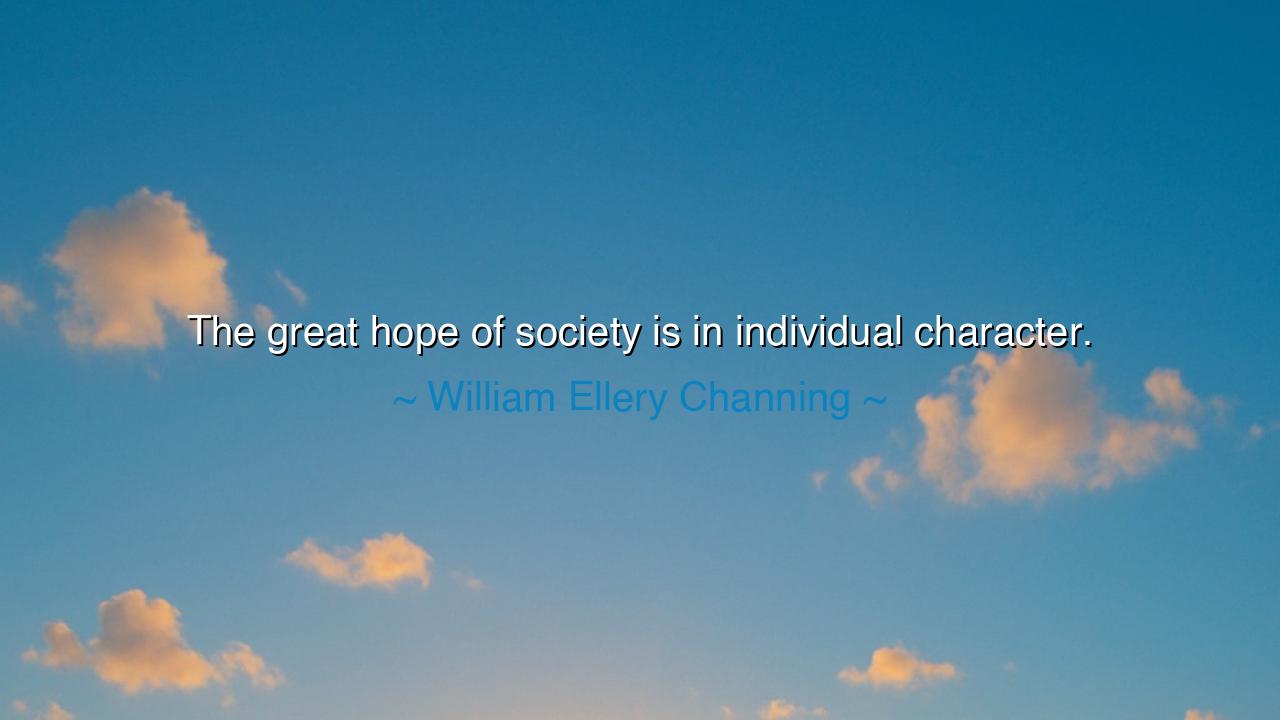
The great hope of society is in individual character.






“The great hope of society is in individual character.” So declared William Ellery Channing, a voice of moral fire in the dawn of America’s conscience. In these few words, he captured a truth that thunders across ages—that the destiny of nations does not rest upon their armies or their gold, but upon the character of the people who dwell within them. For what is a society but a mirror of the souls that compose it? If the heart of one man is corrupted, it wounds a circle. If the hearts of many decay, the whole world darkens. But if even one heart stands upright and true, it can kindle the light that guides an era out of shadow.
Channing was a man of faith and reason, a reformer who lived in a time when the world was wrestling with freedom and morality. He looked upon a young America still shaping its ideals, and he saw that laws alone could not preserve liberty. Without virtue, law becomes mere command. Without integrity, freedom becomes license. Thus he proclaimed that the salvation of any people begins not in the government or the temple, but in the individual soul—in the quiet courage of men and women who choose righteousness over ease, truth over gain, and compassion over power.
The ancients knew this truth before him. The philosopher Plato taught that the just city can only arise from the just man, that before a republic may be wise, the hearts of its citizens must be disciplined and noble. And in the East, Confucius spoke the same law: that the moral order of heaven descends through the heart of man, then into his home, and from his home into the empire. Thus, the smallest act of honesty is not small—it ripples outward like a stone cast into the water, shaping the destiny of nations. The individual character, unseen and uncelebrated, is the root from which civilization grows.
Consider, for example, the life of Mahatma Gandhi, who stood armed with nothing but conscience against an empire of iron. He had no crown, no army, no wealth—only the strength of character that refused to bend before injustice. Yet through his discipline, truthfulness, and love of peace, he awakened the spirit of millions and changed the course of history. Gandhi’s greatness was not born in politics, but in the quiet victories of self-mastery. This is what Channing meant: that the power which sustains a nation does not flow from its rulers, but from the moral courage of its ordinary people.
And what is character, then, but the alignment of one’s actions with one’s deepest truths? It is forged not in comfort, but in trial. The man of character does what is right when no eye watches him, speaks truth when silence would profit him more, and stands firm even when the earth shakes beneath him. Such a soul becomes a pillar in the temple of humanity. When many such souls rise together, their strength becomes a fortress that no tyranny can destroy.
But when a people lose their character, they lose everything. No amount of wealth or knowledge can save a nation whose citizens have forsaken conscience. Corruption begins not in institutions, but in hearts; it grows when men justify small evils for small comforts, until the fabric of society itself unravels. The fall of mighty empires—from Rome to Babylon—was not the work of invading armies alone, but the decay of inner virtue. When the guardians of truth become lovers of ease, when courage yields to convenience, then hope perishes. Thus Channing warns us: the hope of society cannot be bought, legislated, or inherited—it must be cultivated within each human spirit.
Let this be the lesson passed down: do not look to the powerful to save the world; look within. If you wish for a just society, be just. If you long for truth, speak it even when your voice shakes. If you dream of peace, sow kindness in the soil of your own days. The character you build in silence today becomes the foundation of tomorrow’s world. One honest heart is worth a hundred empty creeds.
So remember, my child: the light of civilization burns first in the soul. Tend it as a sacred flame. Guard your integrity as you would guard your life, for in doing so, you uphold the great hope of society. The empire of good cannot be built by decree—it is raised, stone by stone, by the steadfast hearts of those who choose virtue when no one compels them. In this, and this alone, lies the promise of a better world.






AAdministratorAdministrator
Welcome, honored guests. Please leave a comment, we will respond soon